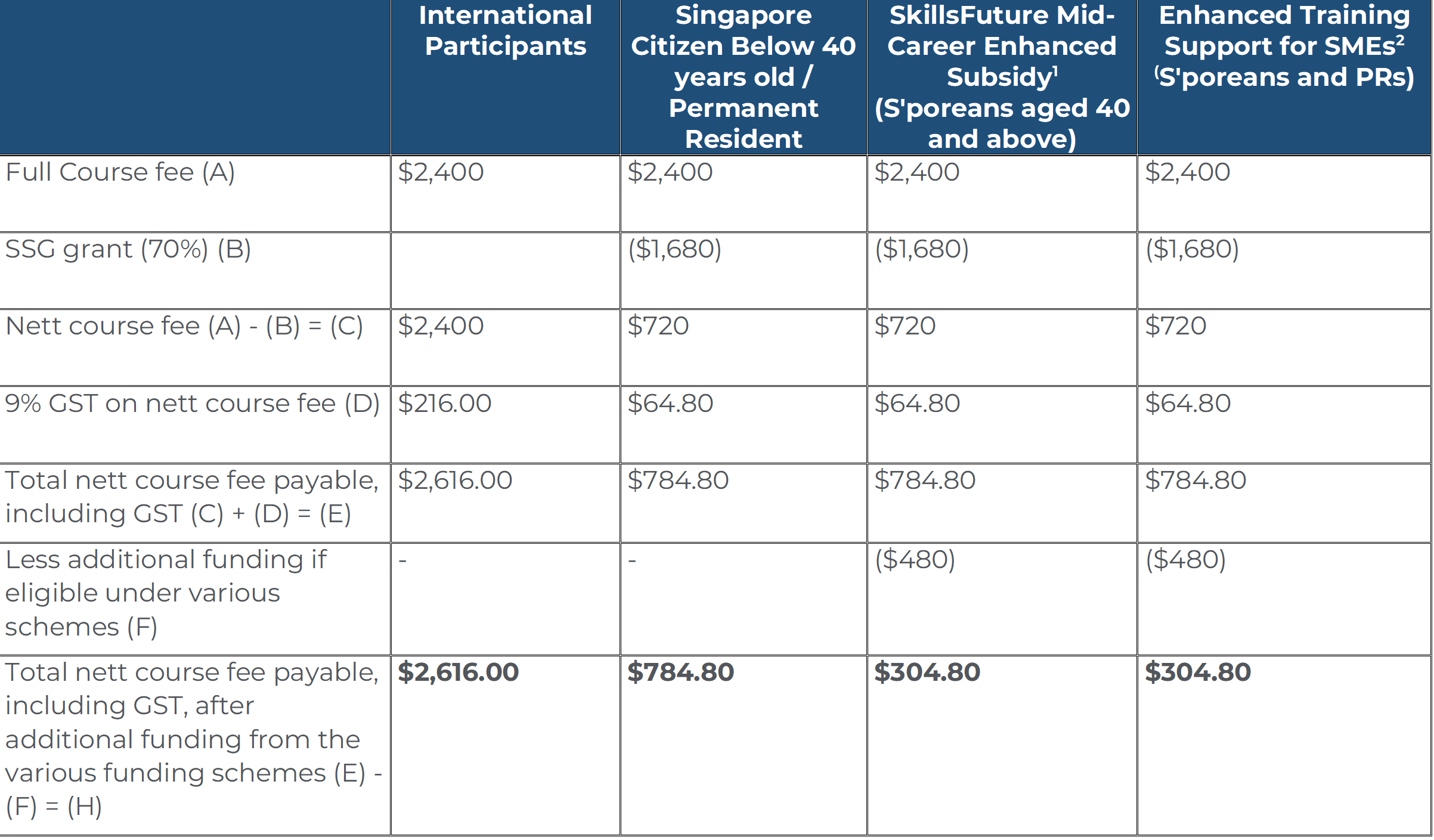Level: Advanced
Duration: 4 days
Dates: 8 - 11 October 2024
Venue: Singapore University of Social Sciences and ZOOM
This course takes a practice-based approach to counselling children and adolescents using developmental, familial, cultural and ethical theories. Participants will learn and apply both theoretical and technical components of child and adolescent psychotherapeutic work across a common structural-procedural psychotherapeutic process.
This programme is for professionals, both counsellors and social workers, as well as individuals embarking on a career switch into the social service sectors seeking to fine-tune their psychotherapy skills with child and adolescent.
- Presentation of problems in children and adolescents
- Developmental Constructs and Principles
- Attachment across lifespan
- Ecological approach to counselling children and adolescents
- Familial, Cultural, Special Needs, Ethical, and Professional Concerns
- Intake Assessments for children and adolescents
- Case formulation and treatment planning
- Ethical considerations when counselling children and adolescents
- Recognising problems in children and adolescents
- Treating problems in children and adolescents
- Working with bereaved children
- Therapy Models (Family Therapy, Behaviour Therapy)
- Different psychotherapy approaches to counselling children and adolescents
- Other problems that may warrant treatment: physical child abuse; foster care; separation and divorce
Learning Outcomes
- Analyse developmental issues in childhood and adolescents.
- Discuss familial, cultural and special needs concerns of children and adolescents.
- Examine ethical and professional issues in counselling children and adolescents.
- Assess and conceptualise problems presented by children and adolescents.
- Assemble a variety of different counselling approaches to working with children and adolescents.
- Design appropriate therapy plans following formulation of a case.
- Apply basic foundational psychotherapy skills in counselling children and adolescents.
- Compare and contrast the theoretical basis of different approaches
- Improve the use of non-verbal approaches to counselling children and adolescents through practice.
- Develop ability to justify personal preference for a counselling approach.
- Evaluate the usefulness of integrative models in counselling children and adolescents.
A. Knowledge and Understanding (Theory Component)
By the end of this course, you should be able to:
- Examine developmental issues in children and adolescents
- Evaluate commonly-used approaches to counselling children and adolescents
- Compare and contrast the theoretical basis of different approaches
- Evaluate the usefulness of integrative models in counselling children and adolescents.
B. Key Skills (Practical Component)
By the end of this course, you should be able to:
- Perform risk assessments of children and adolescents
- Assess and conceptualise problems presented by children and adolescents.
- Apply a variety of psychotherapy skills in counselling children and adolescents
- Employ non-verbal approaches when counselling children and adolescents
- Design appropriate therapy plans following formulation of a case
- Apply integrative models to counselling children and adolescents
| Time | Agenda |
|---|
| Day 1 |
| 09:00 – 10:30 | Presentation of problems in children and adolescents
Developmental constructs and principles
Treatment effectiveness research |
| 10:30 – 10:45 | Break |
| 10:45 – 12:00 | Attachment across the lifespan;
Ecological approach to counselling children and adolescents |
| 12:00 – 13:00 | Lunch |
13:00 – 15:30
| Familial, Cultural, Special Needs, Ethical and Professional Concerns;
Activity: Evaluation of presenting problems |
| 15:30 – 15:45 | Break
|
| 15:45 – 16:30 | Intake Assessments for children and adolescents |
| 16:30 – 17:30 | Discussion |
| Day 2 |
| 09:00 – 10:30 | Treatment Planning |
| 10:30 - 10:45 | Break |
| 10:45 - 12:00 | Case formulation and treatment planning
|
| 12:00 - 13:00 | Lunch |
| 13:00 - 15:30 | Ethical considerations when counselling children and adolescents |
| 15:30 - 15:45 | Break |
| 15:45 - 17:30 | Case study: Advocacy for children and adolescents |
| 16:30 – 17:30 | Discussion |
| Day 3 |
| 09:00 – 10:30 | Recognising problems in children and adolescence |
| 10:30 - 10:45 | Break |
| 10:45 - 12:00 | Treating problems in children and adolescence |
| 12:00 - 13:00 | Lunch |
| 13:00 - 15: 30 | Working with bereaved children
Activity: Role-play
Therapy Models (Family Therapy, Behaviour Therapy) |
| 15:30 - 15:45 | Break |
| 15:45 - 17:30 | Activity |
| 17:30 - 18:00 | Discussion |
| Day 4 |
| 09:00 – 10:30 | Other problems that may warrant treatment: physical child abuse; foster care; separation and divorce |
| 10:30 - 10:45 | Break |
| 10:45 - 12:00 | Different psychotherapy approaches to counselling children and adolescents |
| 12:00 - 13:00 | Lunch |
| 13:00 - 15:30 | Activity: Practise different psychotherapy approaches |
| 15:30 - 15:45 | Break |
| 15:45 - 17:00 | Activity: Practise different psychotherapy approaches |
| 16:30 – 17:30 | Assessment |
Group presentation: case formulation and treatment planning (1hr)
Each group will be provided with a case vignette to work on. They will be tasked to develop a comprehensive case formulation and treatment plan for case they are assigned to.
They will have 45mins to do this assignment as a group and present their case (15mins) and take questions from the lecturer and class.
The groups are expected to demonstrate an understanding of
- Predisposing factors
- Precipitating factors
- Perpetuating factors
- Protective factors
- Utilising the formulation in treatment planning
- Suitable treatment plans for a variety of presenting problems in children and adolescents
- Degree in counselling, and at least 1 year experience in counselling and currently doing counselling work
- Degree in related fields (psychology, social work and education), completed the 5 foundational modules, at least 3 year experience in counselling and currently doing counselling work at an SSA
- Master in Psychology or Master in Social Work, at least 3 year experience in counselling and currently doing counselling work at a SSA and completed the foundational module Practicum: Specialised Counselling Skills
 Dr Elizabeth Lau
Dr Elizabeth Lau
Dr Elizabeth Lau is a Senior Clinical Psychologist with a PhD with Masters of Clinical Psychology from Australia. She is a certified master trainer in Trauma Systems Therapy (TST) and certified practitioner in evidence based programs such as the Positive Parenting Program (Triple P) and Trauma Focused Cognitive Behavioral Therapy (TF-CBT).
Dr Lau provides training and consultation to organisations on issues such as workplace harassment/bullying, sexual misconduct, crisis management and managing trauma. Her trainings focus on promoting healthy personal boundaries to mitigate sexual harassment, harassment and bullying. She trains and coaches staff on being effective first responders in crisis situations and managing disclosure. She currently provides training and consultations to several autonomous universities and government ministries in Singapore.
Dr Lau lectures at the undergraduate and postgraduate level and designs curriculum for postgraduate courses. She provides training and consultation to organizations and has been interviewed on current affairs programs by the Australian Broadcasting Corporation and Mediacorp.
Dr Lau is proficient in conducting trainings, assessments and therapy in English, Mandarin and Cantonese.
Dr Lau has a special interest in children, teens and families. She believes strongly in engaging systems (such as schools, health care providers and communities) to best support children and their families in overcoming social, emotional, behavioural or relational challenges. Dr Lau provides assessments and therapy to children on a broad range of issues including but not limited to trauma, anxiety and depression, attachment and relational difficulties, emotional regulation challenges, excessive gaming and adjustment. She also works closely with schools to provide detailed classroom management plans for children with highly challenging behaviours.
Dr Lau is also experienced in providing forensic assessments in offending behaviors, parenting capacity, custody related disputes and access arrangements. She is also experienced in working with Foster parents and supporting them in their transitions and journey.
Prior to joining the private sector, Dr Lau was a Senior Clinical Psychologist at the Ministry of Social and Family Development where she headed a unit that provided assessments and therapy for families with child welfare concerns and juvenile justice involvement. Dr Lau also supervised multidisciplinary teams of psychologist, social workers and school counsellors in their clinical work with children and families. She has also provided trainings to the courts, police and social services on a variety of topics such as crisis management, forensic interviewing skills etc.
Please submit the following documents to cet@suss.edu.sg:
- Coloured copy (back and front) of NRIC for Singaporeans and PRs, or "Employment"/"S" Pass for foreign applicant
- Application form

1 Mid-Career Enhanced Subsidy: Singaporeans aged 40 and above may enjoy subsidies up to 90% of the course fees.
2 Enhanced Training Support for SMEs: SME-sponsored employees (Singaporean Citizens and PRs) aged 21 and above may enjoy subsidies up to 90% of the course fees.
- Participants are required to achieve at least 75% attendance and pass any prescribed examinations/assessments or submit any course/project work (if any) under the course requirement.
- Participants are required to complete all surveys and feedbacks related to the course
- The course fees are reviewed annually and may be revised. The University reserves the right to adjust the course fees without prior notice.
- Singapore University of Social Sciences reserves the right to amend and/or revise the above schedule without prior notice
For clarification, please contact the SUSS Academy via the following:
Telephone: +65 6248 0263
Email:
CET@suss.edu.sg